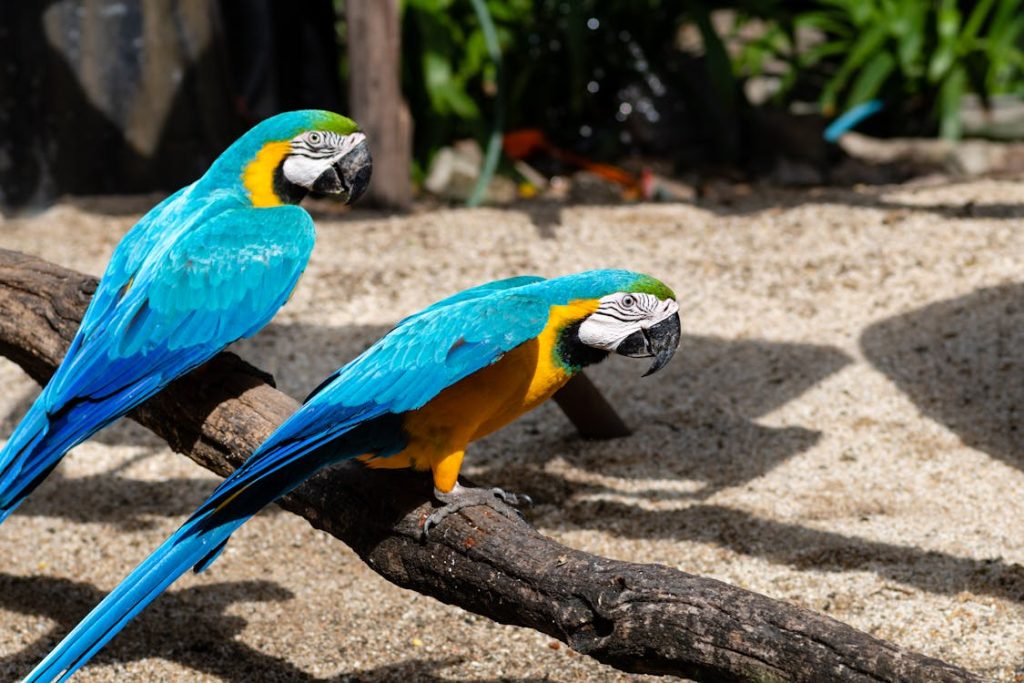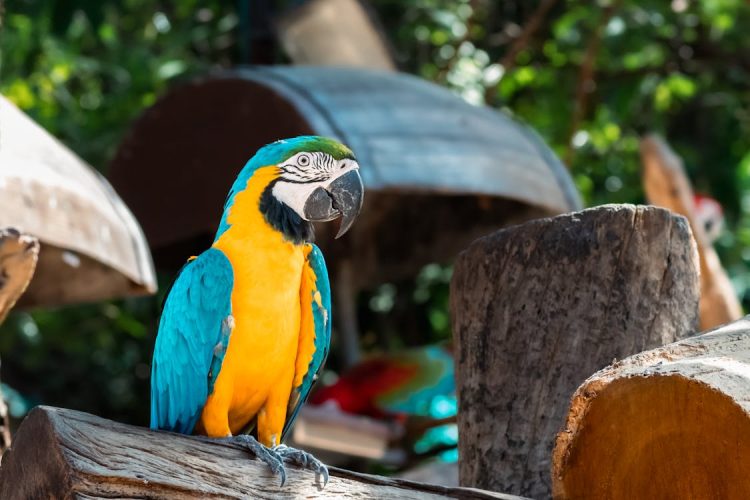Introduction: The Importance of Training and Mental Stimulation for Macaws
Macaws are not only known for their striking beauty and intelligence but also for their high energy levels, complex behaviors, and social nature. These birds can live for decades and form deep, affectionate bonds with their owners. However, training a macaw is an essential part of ensuring that they lead a healthy, happy, and well-adjusted life in captivity. Training macaws isn’t simply about teaching them tricks—it’s about engaging their minds, preventing undesirable behaviors, and fostering a positive relationship.
Training macaws requires patience, consistency, and understanding of their natural behaviors. These intelligent birds are capable of learning a wide variety of commands and tricks, but their training must be approached in a way that respects their emotional needs, unique temperament, and natural instincts.
In this article, we will provide a detailed guide to training your macaw. From basic obedience and behavioral training to advanced tricks and mental stimulation techniques, we will explore the most effective methods for ensuring your macaw remains well-behaved, mentally healthy, and happy.
I. Understanding Macaw Behavior and Personality
A. Why Training Is Important for Macaws
Macaws, like all parrots, are highly social and intelligent birds that require mental stimulation to stay healthy and engaged. Without proper training and interaction, macaws can develop undesirable behaviors such as excessive screaming, aggression, or feather plucking. Training helps channel your macaw’s energy in positive directions, and it can also serve to prevent boredom-related problems that arise from living in captivity.
Training provides a variety of benefits for both the bird and the owner:
- Positive Bonding: Training sessions can enhance the emotional connection between you and your macaw, providing opportunities for mutual trust and understanding.
- Behavioral Management: Effective training can help manage and eliminate undesirable behaviors, such as biting, screaming, or destructive chewing.
- Mental Stimulation: Macaws are highly intelligent, and without enough mental stimulation, they may resort to destructive behaviors. Training provides much-needed cognitive challenges.
- Socialization: Training also helps your macaw learn how to behave in social situations, making it easier for them to interact with other pets, family members, or visitors.
B. Understanding Macaw Intelligence and Temperament
Macaws are among the most intelligent bird species, and their cognitive abilities allow them to learn a wide variety of tasks, commands, and tricks. However, their intelligence can also make them more challenging to train because they tend to get bored easily if the training process isn’t engaging enough. They are highly social birds that thrive on attention and interaction, which means they enjoy being part of a family dynamic.
- Macaws Are Highly Social: They form strong bonds with their owners and enjoy being involved in daily activities. Training sessions can strengthen this bond.
- Playful Nature: Macaws are playful and curious, which makes them excellent learners when training is fun and engaging.
- Strong-Willed: While macaws are eager to learn, they can also be stubborn and independent. This can make training a challenge if not handled correctly.
- Vocal and Expressive: Macaws can communicate through vocalizations, which means you’ll need to address noise-related behaviors during training, especially if your macaw tends to be loud.
II. Preparing for Training: Setting the Foundation
A. Establishing Trust and Building a Relationship
Before beginning formal training, it’s crucial to build trust with your macaw. Macaws are sensitive birds, and they need to feel comfortable and safe in their environment. A positive relationship with their owner makes the training process much easier and more enjoyable.
- Spend Time with Your Macaw: Interact with your bird daily to create a strong bond. Speak to them gently, offer treats, and allow them time to explore.
- Be Patient and Calm: Macaws can pick up on their owner’s emotions. Remaining calm and patient during interactions will help your macaw feel secure.
- Respect Their Space: Let your macaw come to you on their own terms, especially in the beginning stages. Forcing interaction can create fear or stress, hindering the training process.
B. The Right Environment for Training
Creating a training environment that is calm, distraction-free, and conducive to learning is essential for successful training. Some key points to consider:
- Quiet, Safe Space: Set up a space where there are minimal distractions. Turn off the TV or radio, and choose a time when the household is calm.
- Proper Equipment: Ensure that you have the right tools for training, such as:
- Positive Reinforcement Tools: Treats, clickers, or toys.
- Training Perches: Stable surfaces where your macaw can sit during training.
- Timing: Choose a time when your macaw is neither too tired nor too hungry. Training sessions should be fun and engaging, not forced.

III. Basic Training for Macaws: Essential Commands and Behaviors
A. Getting Started with Simple Commands
Just like any pet, macaws need to learn basic commands that help them understand what you expect from them. These commands also serve as the foundation for more advanced training.
- Step Up:
- Purpose: This is one of the most fundamental commands for macaws, as it teaches them to step onto your hand or arm.
- How to Train: Hold your hand or a perch close to your macaw’s chest. When they step onto it, say “step up” and reward them with a treat or praise.
- Step Down:
- Purpose: This command teaches your macaw to step down from a perch or your hand.
- How to Train: Hold your hand just below their feet, and when they step down, use the command “step down” and reward them.
- Come Here:
- Purpose: This command is important for calling your macaw to you.
- How to Train: Sit in front of your macaw and use a positive tone to say “come here” while gently patting your leg or offering a treat. Once they approach, reward them with praise or a treat.
B. Using Positive Reinforcement
Macaws respond well to positive reinforcement, which involves rewarding desired behaviors immediately after they occur. This method encourages your bird to repeat the behavior.
- Treats: Offer small, healthy treats immediately after your macaw performs the desired behavior. Treats could include pieces of fruit, nuts, or seeds.
- Praise: Verbal praise, such as “good bird” or “well done,” helps reinforce the behavior.
- Clicker Training: This method uses a distinct sound (from a clicker) to signal that your macaw has performed the desired behavior. The sound is followed by a treat to reinforce the action.
C. Correcting Undesirable Behaviors
While positive reinforcement works well for teaching good behaviors, it’s also essential to address negative behaviors. Macaws are quick to learn both good and bad behaviors, so it’s vital to correct undesirable actions as soon as they arise.
- Biting: If your macaw bites, avoid reacting dramatically. Instead, calmly say “no” and redirect their attention to a toy or a more positive behavior.
- Screaming: If your macaw screams excessively, avoid giving them attention during the outburst. Only reward calm behavior by offering treats when they are quiet.
- Destructive Chewing: Offer chew toys and ensure your macaw has plenty of things to chew on. If they chew on inappropriate items, gently redirect their focus to a toy.
IV. Advanced Training for Macaws: Teaching Tricks and Mental Stimulation
A. Teaching Macaws Fun Tricks
Once your macaw has mastered basic commands, you can start teaching them fun tricks. These tricks are not only entertaining but also mentally stimulating for your bird.
- Wave:
- Purpose: Teaching your macaw to wave is a fun and interactive trick.
- How to Train: Gently lift your macaw’s foot with your finger while saying “wave.” Reward them when they lift their foot on their own.
- Play Dead:
- Purpose: This dramatic trick involves your macaw pretending to fall over and play dead.
- How to Train: Gently tilt your macaw on its back and say “play dead.” Reward them for staying in position.
- Roll Over:
- Purpose: Another fun and advanced trick that involves your macaw rolling over.
- How to Train: Use a treat to guide your macaw to roll over, and reward them for completing the action.
B. Using Puzzle Toys for Mental Stimulation
Macaws thrive on mental challenges, and providing puzzle toys or foraging opportunities is crucial for their mental health. Some toys allow macaws to solve problems, which mimics natural behaviors in the wild.
- Foraging Toys: Place treats or food inside puzzle toys or hidden compartments that your macaw has to figure out how to open.
- Interactive Toys: Toys that require manipulation or problem-solving can keep your macaw engaged for extended periods.
V. Troubleshooting Common Training Challenges
A. Dealing with Stubbornness or Resistance
Sometimes, macaws can be stubborn, and training may not always go as smoothly as expected. Here’s how to handle some common challenges:
- Lack of Interest: If your macaw is not motivated by the treats you are offering, try switching to different types of rewards or introducing new activities.
- Distractions: If your macaw is easily distracted, try training in a quieter room or increase the duration of training sessions gradually to improve their focus.
- Behavior Regression: Occasionally, macaws may “forget” previously learned commands. Be patient, and return to basic training steps to reinforce the behavior.
B. Consistency Is Key
Consistency is one of the most important elements of training. Make sure to practice training sessions regularly, and ensure that everyone in the household uses the same commands and rewards.
VI. Conclusion: The Rewards of Training Your Macaw
Training your macaw isn’t just about teaching them tricks—it’s about providing them with the mental stimulation, engagement, and structure they need to thrive. It strengthens the bond between you and your bird, prevents behavioral problems, and ensures that your macaw remains a happy, healthy companion.
By implementing the techniques discussed in this article, you’ll be well on your way to having a well-trained, well-adjusted macaw. Remember, training should be a positive experience for both you and your bird, so be patient, consistent, and always focus on building a strong relationship through positive reinforcement.























































